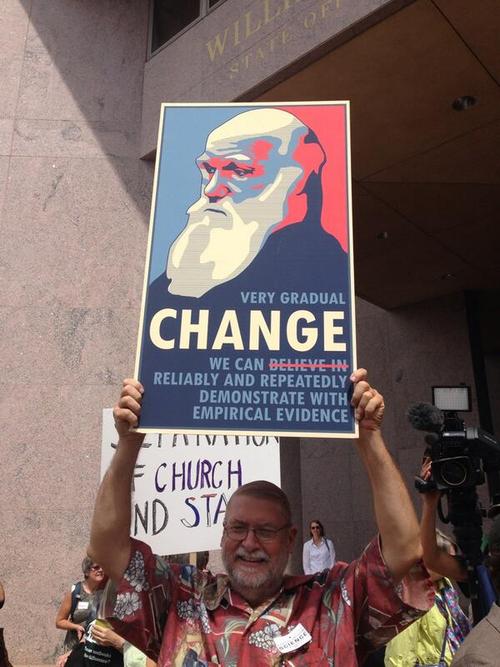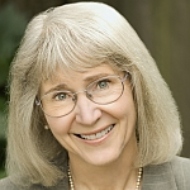
While listening on Tuesday to the Texas State Board of Education hearings on the adoption of science textbooks, I couldn’t help but think, “There they go again”, as citizens extolled that:
Microevolution is OK, but “macroevolution” is not acceptable. Evolution is a religion that equates to atheism. Because evolution requires billions of years with no one watching, it isn’t really science. Edwards v. Aguillard encourages the teaching of “alternate theories”–like creationism. The probability of life being created through natural processes is equivalent to a tornado assembling a jet plane from a junkyard. (Really!!)
It was almost a relief when an antievolutionist contended that the books should be rejected because they don't include epigenetics. At least the epigenetics argument is relatively recent (perhaps only 5-8 years old). In creation-think, including epigenetics in biology textbooks will weaken evolution because epigenetics is evidence against evolution. Yeah, I know it isn’t, but to creationists, any process that isn’t natural selection weakens natural selection as an evolutionary mechanism, and if natural selection isn’t strong enough to produce evolution, that means that evolution didn’t take place, and…and…You get the picture. Never mind that epigenetics isn't in the TEKS, the state science education standards, and generally isn't a topic for beginning biology learners.
We’ve heard this before. More than once: NCSE has been helping Texans in the Texas textbook wars since 1989. Still, it has to be done, and it’s worth doing.
Hearings of this kind are political theater, not scientific exchanges. But political theater is necessary. After all, what goes into textbooks in Texas is determined only partly by scientists and educators; science education is politicized in Texas and many other places in the US. If we don’t show up, we don’t get a place at the table. Our side (and yes, there are moderates on the SBoE who need public backing to do the right thing) is weaker if people on our side don’t turn out to testify.
So we owe a big vote of thanks to the Texas citizens who spent a long day waiting to testify in Austin. Want to see them yourself? The Texas Education Agency kindly posts video of testimony here.
And because it is theater, you want the performances of people on our side to be effective. Conservatives on the board could discredit testimony of evolution supporters pretty quickly if the testifier launched into a discussion of how creationism shouldn’t be in the textbooks. David Bradley, for example, could rhetorically ask “Is creationism in the TEKS?” “Is creationism in the textbooks?” and of course, the answer is no. Creationism isn’t found either in the TEKS or in any of the textbooks. One of the board members even offered $500 if anyone could find “Jesus, Buddha, or Muhammad” in the TEKs or in the textbooks. The issue isn’t about teaching creationism–at least not on the surface.
It’s much more subtle than that. It’s about sneaking creationism in through the back door. The immediate issues before the board, and the issues that testifiers needed to concentrate on, were whether the textbooks submitted met the requirements of the TEKS, had errors, or were solid science, and whether they should be adopted with or without changes. Some reviewers on the board-appointed review committee–some with distinctly limited expertise in biology–had recommended publishers be required to make changes that would have dumbed down the textbooks in a way that would open the door to the explicit or implicit presentation of creationism.
That’s what needed to be addressed. Testifiers on our side needed to drive home this message: don’t let the other side get away with putting wrong stuff that disparages evolution into the textbooks.
NCSE’s Josh Rosenau nailed it in his testimony. Josh focused on errors in the reviews, and got a useful followup question from a thoughtful board member that allowed him to elaborate on the underlying anti-evolution/pro-creationism agenda of the creationist reviewers.
How did the board get in a position where some of the reviewers offered such terrible advice about the textbooks? Why weren’t better-qualified people appointed to the review panels? Clearly the procedure by which textbook reviewers are selected needs work. Texas Freedom Network’s Kathy Miller called for establishing minimum qualifications for reviewers–that they exhibit actual expertise in the subject matter—and for establishing a more transparent reviewing procedure, including public release of the evaluations. (TFN had to file a public records act request to get them this time).
So thanks to all of the good guys who showed up. Steve Schafersman of Texas Citizens for Science valiantly held forth for good science, as usual, and live-blogged the hearings. He was joined by Zack Kopplin, Arturo de Lozanne, Aron Nelson, Ron Wetherington, John Blanton, and many others. Of course Texas Freedom Network did its usual sterling work, including a public records request that revealed the creationists presence on the review committee. TFN also live-blogged the hearings.
Y’all done good. Thanks for being there.

